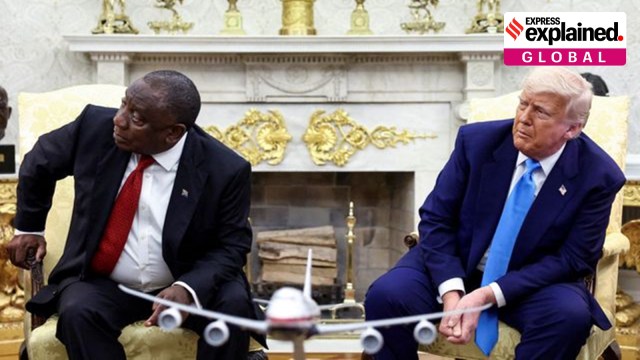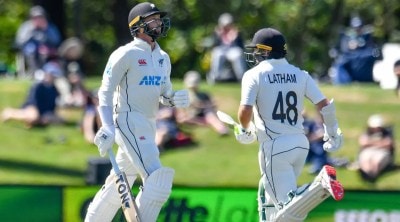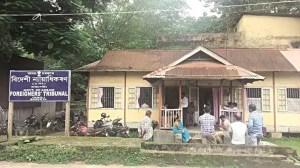‘Genocide’ of white South Africans? A closer look at Donald Trump’s claims
Who are the Afrikaners, and why is Trump talking about a 'white genocide' in South Africa?
 US President Donald Trump and South African President Cyril Ramaphosa looks towards a monitor (not pictured) that shows videos allegedly pertaining to the genocide of white people in South Africa, in the Oval Office of the White House. (Photo: Reuters)
US President Donald Trump and South African President Cyril Ramaphosa looks towards a monitor (not pictured) that shows videos allegedly pertaining to the genocide of white people in South Africa, in the Oval Office of the White House. (Photo: Reuters) When US President Donald Trump announced this year that members of South Africa’s Afrikaner community would be granted refugee status in the United States, his reasoning was blunt: white farmers, he said, were the victims of a “genocide”. The South African government permitted US officials to process applications within the country and allowed nearly 60 individuals to board a chartered flight to the US.
Trump’s assertion, earlier made in public statements, was repeated in a confrontational meeting with South African President Cyril Ramaphosa at the White House recently. The encounter was made even more high-profile by the presence of Trump’s South African-born adviser, Elon Musk, and a swarm of journalists.
Who are the Afrikaners?
As described by non-profit South African History Online, Afrikaners are descendants of mostly Dutch (34.8%), German (33.7%) and French (13.2%) settlers who arrived in South Africa in the mid-17th century. Over time, this group — also known as Boers (meaning “farmers”) — developed a unique cultural and linguistic identity rooted in the Afrikaans language, closely related to Dutch.
During the apartheid era, which formally began in 1948 under Afrikaner-led governments, this community wielded enormous political and economic power. Apartheid legally enforced racial segregation and systematically oppressed black South Africans. The regime fell in 1994 with the election of Nelson Mandela and the African National Congress (ANC), ushering in a democratic era and ending white-minority rule.
Today, Afrikaners make up roughly 4 per cent of South Africa’s population of over 60 million, numbering more than 2.5 million people.
What has Trump claimed?
Trump has often repeated a claim popular among far-right groups: that white South African farmers are being “brutally killed” and “their land is being confiscated”. He has referred to these killings as part of a “genocide,” a term not used by any major human rights body, international institution, or domestic political party in South Africa, including those representing the white community.
Genocide is a term with specific legal and historical weight, typically referring to the systematic attempt to annihilate a group based on race, ethnicity, religion or nationality.
At the White House meeting on Wednesday, Trump ambushed Ramaphosa with videos he claimed showed proof of genocide. One included footage of an opposition politician singing a controversial protest song. Ramaphosa responded that such songs are protected under free expression and that crimes in South Africa affect people of all races.
Showing a video of a rural road lined with crosses to Ramaphosa, Trump claimed it was footage of “burial sites” of over “1,000 white farmers”. However, an analysis of the video by The New York Times found that the footage showed a memorial procession on September 5, 2020, near Newcastle, South Africa. The event, according to a local news website, was for a white farming couple in the area murdered in late August of that year. The crosses were planted in the days ahead of the event and were later removed.
Are white South Africans being targeted?
The short answer from South African authorities and courts is: no.
South Africa does not release crime figures disaggregated by race, but government data for the period between October and December 2024 recorded 6,953 murders. Of those, 12 occurred in farm attacks. Among the dead: one was a farmer, five were farm dwellers, and four were employees.
A South African judge in February 2025 dismissed the notion of a white genocide as “clearly imagined” and “not real” during an inheritance case involving the white supremacist group Boerelegioen.
What is the discourse in South Africa?
No major South African political party, including the right-wing Freedom Front Plus or the centrist Democratic Alliance (DA) — both of which draw support from the white community — claims a genocide is occurring. President Ramaphosa has said that such allegations are “completely false” and suggested that those emigrating are doing so because they are unwilling to embrace the constitutional changes of post-apartheid South Africa.
Nonetheless, some Afrikaner groups have voiced concern. In 2025, roughly 70,000 Afrikaners expressed interest in relocating to the US, according to a local business group quoted by BBC. This figure remains a small fraction of the total Afrikaner population. The lobby group Solidarity has published articles encouraging Afrikaners to remain in South Africa, and FF+ leader Corné Mulder recently told parliament: “We are bound to Africa and will build a future for ourselves and our children here.”
What about land reform?
Another controversial element cited by Trump is the issue of land ownership. South Africa continues to grapple with its apartheid legacy, in which black South Africans were dispossessed of land. A law signed by Ramaphosa in January this year seeks to address this historic injustice but has been criticised by the DA, who say it undermines property rights. They have pledged to challenge it in court.
Musk, too, has waded into the row. He accused South Africa of having “racist ownership laws” after his company Starlink was unable to operate there. In response, South Africa’s telecoms regulator, Icasa, clarified that Starlink never submitted a licence application. Local law requires 30% ownership by historically disadvantaged groups to receive an operating licence — part of broader efforts to redress apartheid-era exclusion.
What about the controversial song?
At the centre of the cultural row is the chant “Shoot the Boer,” frequently sung by Julius Malema, leader of the radical Economic Freedom Fighters (EFF). Afrikaner lobby groups have tried to have it banned, arguing that it incites violence. South Africa’s Supreme Court of Appeal disagreed, ruling that the lyrics — originating in anti-apartheid struggle — do not amount to hate speech when used in political protest.
The court noted that a “reasonably well-informed person” would not interpret the words literally, but as a provocative form of political expression.
So, is there racial discrimination against whites?
While many white South Africans remain economically privileged relative to the black majority, some policies aimed at correcting historical imbalances have drawn criticism from within the white community.
For instance, the Employment Equity Act sets diversity targets for companies, and certain job postings have at times been reserved for specific racial groups to achieve representation. Critics, including the DA, argue that these laws may marginalise some groups and enable corruption. One recent job ad in the sports ministry reserved posts for Coloured, Asian, and white applicants, prompting backlash. Minister Gayton McKenzie defended it as an attempt to balance departmental demographics.
White South Africans, however, still occupy a disproportionate share of top management roles — 62.1% of them, despite comprising only 7.7% of the economically active population, according to South Africa’s Commission for Employment Equity.
- 01
- 02
- 03
- 04
- 05






































